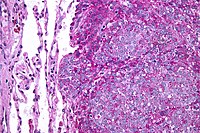
Photo from wikipedia
Simple Summary It is known that doxorubicin is one of the standards for chemotherapy treatment against Ewing sarcoma. Despite its widespread use, doxorubicin treatment initiates tumor escape mechanisms and disease… Click to show full abstract
Simple Summary It is known that doxorubicin is one of the standards for chemotherapy treatment against Ewing sarcoma. Despite its widespread use, doxorubicin treatment initiates tumor escape mechanisms and disease relapse. Our study aims to identify the potential biomarkers of doxorubicin resistance in primary cultures of Ewing sarcoma cells using single-cell transcriptomic and proteomic analyses. To assess the specificity of identified gene biomarkers, we used publicly available datasets to represent mRNA profiles of patient samples and short-lived cultures of tumor cells, established earlier. Through our investigation, we confirmed that MGST1 and the new marker COL6A2 are both produced by doxorubicin-resistant cells and demonstrated clinical significance for the survival of patients with Ewing sarcoma. Abstract Background: Ewing sarcoma (ES) cells exhibit extreme plasticity that contributes to the cell’s survival and recurrence. Although multiple studies reveal various signaling pathways mediated by the EWSR1/FLI1 fusion, the specific transcriptional control of tumor cell resistance to doxorubicin is unknown. Understanding the molecular hubs that contribute to this behavior provides a new perspective on valuable therapeutic options against tumor cells. Methods: Single-cell RNA sequencing and LC-MS/MS-based quantitative proteomics were used. Results: A goal of this study was to identify protein hubs that would help elucidate tumor resistance which prompted ES to relapse or metastasize. Several differentially expressed genes and proteins, including adhesion, cytoskeletal, and signaling molecules, were observed between embryonic fibroblasts and control and doxorubicin-treated tumor cell lines. While several cancer-associated genes/proteins exhibited similar expression across fibroblasts and non-treated cells, upregulation of some proteins belonging to metabolic, stress response, and growth pathway activation was uniquely observed in doxorubicin-treated sarcoma cells, respectively. The novel information on differentially expressed genes/proteins provides insights into the biology of ES cells, which could help elucidate mechanisms of their recurrence. Conclusions: Collectively, our results identify a novel role of cellular proteins in contributing to tumor cell resistance and escape from doxorubicin therapy and contributing to ES progression.
Journal Title: Cancers
Year Published: 2022
Link to full text (if available)
Share on Social Media: Sign Up to like & get
recommendations!